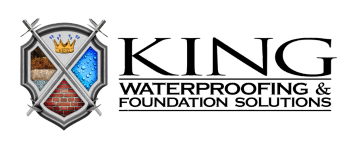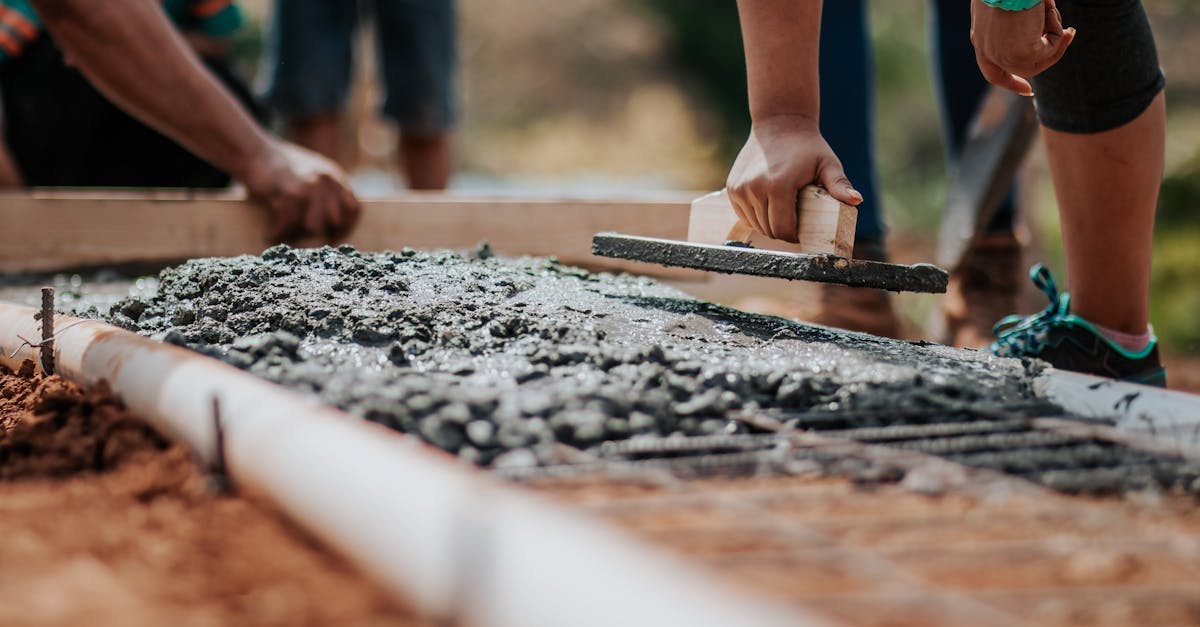Uneven concrete surfaces can be more than just an eyesore—they’re a safety hazard and can lead to costly repairs if ignored. Concrete leveling offers a practical solution to restore balance and functionality without the need for complete replacement. This process involves raising and leveling sunken concrete slabs to their original position, ensuring a smooth, even surface.
King Waterproofing & Foundation Solutions specializes in concrete leveling, providing expert services to address these common issues. With their advanced techniques and experienced team, they can effectively tackle any concrete leveling project, ensuring long-lasting results. Discover how concrete leveling can save you time, money, and stress while enhancing the safety and appearance of your property.
Understanding Concrete Leveling
Concrete leveling corrects uneven surfaces by lifting the existing concrete instead of removing and replacing it. This process uses materials like polyurethane foam or a cementitious slurry injected beneath the slab.
Methods of Concrete Leveling
- Polyurethane Foam Injection: Technicians drill small holes in the concrete, inject foam, and allow it to expand, lifting the slab to the desired level. Foam cures quickly, allowing for immediate use of the surface.
- Mudjacking (Slabjacking): This involves pumping a slurry made of cement, sand, and water beneath the concrete. Although effective, mudjacking can take longer to cure and might not be suitable for some modern applications.
Benefits of Concrete Leveling
- Cost-Effective: Leveling saves 50-70% of the costs of full replacement. Real estate owners can use the services to maintain budget control.
- Time-Saving: The process completes in a few hours compared to days for replacement. Immediate use of the area minimizes disruption.
- Aesthetic Improvement: Leveling restores the appearance of surfaces, enhancing property value. This is especially crucial for commercial spaces.
- Increased Safety: Reducing trip hazards decreases the risk of injuries. Property managers can ensure compliance with safety standards.
- Durability: Properly leveled concrete can last upwards of 10-15 years. Quality materials and techniques improve long-term performance.
Applications of Concrete Leveling
- Driveways: Ensuring a smooth surface eliminates vehicle damage and enhances curb appeal.
- Sidewalks: Leveling eliminates trip hazards and maintains pedestrian safety.
- Patios: Smooth, even surfaces enhance usability and visual appeal for outdoor spaces.
- Basement Floors: Leveling reduces water seepage risks and prepares surfaces for flooring installations.
- Experience: Years in the industry and a portfolio of completed projects.
- Techniques: Mastery of various methods like foam injection and mudjacking.
- Reputation: Positive customer reviews and industry certifications.
- Materials Used: Quality materials ensure long-lasting results and reduce the risk of future issues.
Different Methods of Concrete Leveling
Various methods exist for leveling concrete, each with unique advantages depending on the specific situation.
Mudjacking
Mudjacking, also known as slabjacking, involves lifting concrete slabs by injecting a mixture beneath them. Technicians drill small holes in the concrete surface and pump a slurry mixture of cement, sand, and water through these holes. This mixture fills voids under the slab and raises it to the desired level. Mudjacking offers cost savings compared to replacement and is effective for large surfaces like driveways and patios. However, the curing process is slower, requiring up to 24 hours before the area can be used.
Polyurethane Foam Injection
Polyurethane Foam Injection provides a faster alternative to mudjacking. This method involves injecting a polyurethane foam beneath the concrete through small holes. The foam expands, filling voids and lifting the concrete. Polyurethane Foam Injection offers rapid curing, often allowing use of the leveled surface within 15 minutes. It’s ideal for areas needing immediate attention, like sidewalks and high-traffic zones. The foam’s lightweight nature also reduces the risk of further settlement.
Self-Leveling Compounds
Self-leveling compounds offer a straightforward method for smaller leveling tasks. These compounds are typically a mixture of cement and polymer, designed to flow and spread easily. Applied directly to the surface, they create a smooth, even layer as they set. Self-leveling compounds are suitable for interior applications such as basement floors and smaller surface issues. They provide a quick fix, often ready for use within a few hours, and enhance the surface’s appearance and functionality.
By understanding these concrete leveling methods, property owners can choose the best solution for their specific needs, ensuring long-term stability and safety.
Benefits of Concrete Leveling
Concrete leveling provides numerous advantages, ensuring concrete surfaces are even and safe. It’s a cost-effective, durable, and quick solution for property owners.
Cost-Effectiveness
Concrete leveling offers substantial cost savings, often 50-70% less than full slab replacement. This method uses existing concrete, minimizing material and labor costs. For example, leveling a driveway costs significantly less compared to tearing it out and pouring new concrete. Moreover, fixing issues early prevents more extensive damage and higher expenses in the future.
Durability
High durability makes concrete leveling an attractive choice. Properly leveled surfaces typically last 10-15 years, depending on usage and environmental factors. Techniques like Polyurethane Foam Injection enhance longevity by creating a solid base under the slab. For instance, sidewalks and patios benefit from this extended lifespan, maintaining their structural integrity over time.
Quick Application
Concrete leveling is executed swiftly, reducing downtime for property owners. Polyurethane Foam Injection allows immediate use of the area post-application due to its rapid curing time. This is ideal for high-traffic zones like commercial driveways or warehouse floors. In contrast, Mudjacking might require longer curing but remains viable for larger surfaces where immediate use isn’t critical.
Concrete leveling, therefore, stands out as a reliable restoration method, blending cost-efficiency, durability, and speed.
When to Consider Concrete Leveling
Concrete leveling is critical for maintaining safe, aesthetically pleasing surfaces. Various indicators signal when it’s time to consider this cost-effective solution.
Signs You Need Concrete Leveling
Visible Cracks: Cracked concrete suggests shifting or settling. Leveling these areas prevents further damage.
Sinking Sections: Uneven slabs indicate soil erosion beneath. Addressing these early can prevent extensive damage.
Water Pooling: Puddles on concrete surfaces show low spots. Leveling helps ensure proper drainage.
Trip Hazards: Raised sections of concrete pose risks. Leveling these sections enhances safety.
Situations Unsuitable for Leveling
Severely Damaged Concrete: Extensive cracks or crumbling indicate a need for replacement, not leveling.
Extensive Soil Problems: Leveling isn’t effective on ground with significant soil issues, such as expansive clay or organics.
Poor Drainage: Areas with fundamental drainage issues might require addressing the root problem before leveling.
Choosing a Professional for Concrete Leveling
Selecting the right expert is crucial for ensuring a high-quality concrete leveling job. Taking certain factors into account can help you make an informed choice.
Key Factors to Evaluate
- Experience: Look for professionals with several years of experience (ideally, more than five) in concrete leveling. Experienced contractors, like King Waterproofing & Foundation Solutions, often deliver better results.
- Techniques Used: Ensure the contractor is proficient in various methods, including Polyurethane Foam Injection and Mudjacking. Proficiency with multiple techniques indicates versatility and adaptability.
- Reputation: Research online reviews and testimonials. Positive feedback on platforms like Google and Yelp suggests reliability and customer satisfaction.
- Certification: Verify that the contractor holds relevant licenses and certifications. These often reflect compliance with industry standards.
- Guarantees/Warranties: Check if the contractor offers warranties for their work. Warranties can provide peace of mind regarding the longevity and quality of the job performed.
- Cost Estimates: Request detailed quotes. A transparent estimate typically includes material and labor costs, ensuring there are no hidden charges.
- What is your experience with concrete leveling?: This verifies their expertise in the field.
- Which concrete leveling method do you recommend for my project?: Determines if they understand the best approach for your specific situation.
- Do you have any references or testimonials?: Helps you gauge past client satisfaction.
- What does your warranty cover?: Clarifies what is included in their warranty and the duration.
- How long will the project take?: Ensures they can complete the project within your timeline.
- Can you provide a detailed estimate?: Ensures transparency in costs, helping avoid unexpected expenses.
Conclusion
Concrete leveling stands out as a practical and economical solution for addressing uneven surfaces. By opting for this method, property owners can enhance safety, improve aesthetics, and save both time and money. King Waterproofing & Foundation Solutions exemplifies expertise in this field, offering reliable and advanced techniques to ensure lasting results. Whether it’s driveways, sidewalks, or patios, maintaining smooth surfaces is crucial for safety and property value. Choosing the right professional for the job guarantees a high-quality outcome, making concrete leveling a wise investment for any property.



